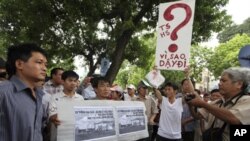Vietnam’s recent crackdown on anti-Chinese protesters marks a shift in its handling of its territorial dispute with Beijing.
Tensions high over disputed territory
After tolerating weekly protests in front of the Chinese Embassy in Hanoi for more than a month, the Vietnamese government has moved to halt them.
On Sunday, police swept up about 12 protesters and detained them for several hours.
The arrests start a new phase in Vietnam’s dispute with China over territory in the South China Sea. China claims almost all the sea, but Vietnam and four other governments have claims in the region, including the Spratly Islands, which sit atop mineral deposits.
Tensions spiked in recent months after Hanoi accused its giant neighbor of intruding into its waters. Beijing says Vietnamese boats illegally entered its territory and endangered Chinese fishermen.
Temperatures have cooled since June 25, when Vietnam's deputy foreign minister visited Beijing. After the visit, the two sides said they stressed the need to “steer public opinion along the correct direction” to avoid damaging the relationship.
Carl Thayer, a Southeast Asia expert at the University of New South Wales in Australia, says the arrests Sunday are in line with that statement.
"I think [thought] once the special envoy went to China and put his name on that joint press release it was incumbent on Vietnam to tone down and stop the protests. The arrests follow the prior week when police tried to break up the demonstrations and get them to go home,” he said.
Calming protests
Thayer says by halting the protests, Hanoi can tell China it fulfilled its side of the agreement. But he notes, Hanoi could have easily stopped them much earlier. “To make a point, when they don’t like Catholics they mobilize youth and veterans to go beat them up. In this case they would have been aware of it [the protests], public security would have picked that up immediately,” Thayer noted.
Other Vietnam experts say that Hanoi tolerated, or perhaps encouraged, the protests but reined them in to avoid building up tensions with China.
A spokesperson for Vietnam’s Ministry of Foreign Affairs rejects such allegations. “As I’ve said in previous conferences, this is the response of the Vietnamese people to developments in the East Sea," MOFA stated.
Changing tactics
Thayer says China, too, has changed tactics, trying to be more conciliatory. “For the moment it’s smiling and trying to use more diplomatic language to soften the situation, so there is a change of tactics,” Thayer stated.
Thayer notes that both sides may be watching the United States relationship with the Association of Southeast Asian Nations. Four ASEAN states have claims in the South China Sea.
Later this month, U.S. Secretary of State Hillary Clinton will join foreign ministers from ASEAN, China, Japan and other countries in Indonesia. The South China Sea issue is expected to be on the agenda.
Washington has previously stated that it has a national interest in ensuring freedom of navigation in the region.




